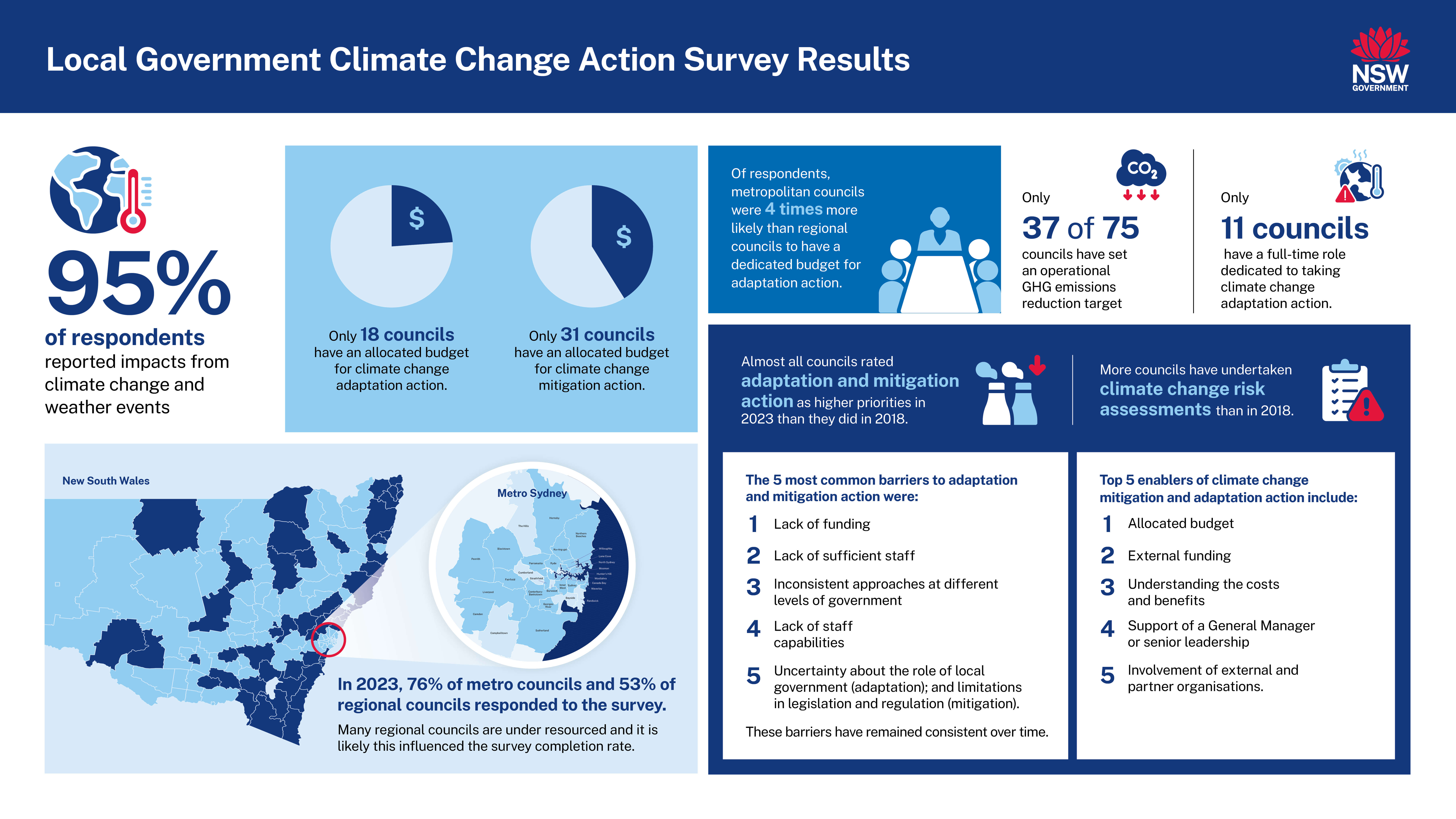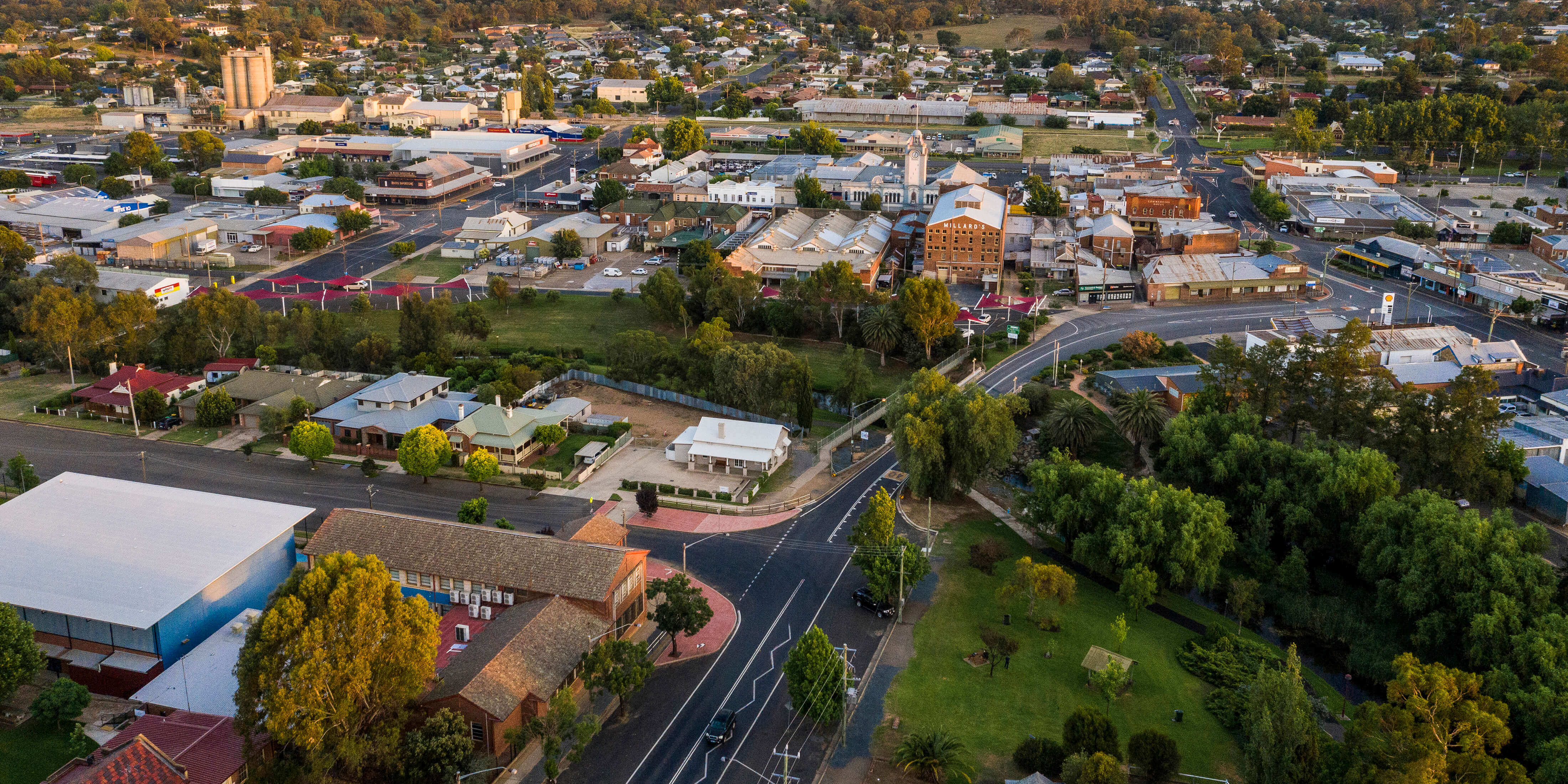Almost 95% of councils that took part in the 2023 Climate Change Action Survey are feeling the impacts of climate change, and a record number are prioritising action to reduce their emissions and help their communities adapt.
Councils are collaborating more than ever, sharing knowledge and expertise to conduct risk assessments, develop solar grants programs, establish power purchase agreements for renewable energy, roll out electric vehicle charging stations and upgrade their buildings.
Melissa Sawatske - Senior Policy Officer - Environment, Local Government NSW
Climate change is damaging local government assets and infrastructure, causing serious disruptions to the delivery of services, hitting council budgets and harming the health and wellbeing of communities. But a record number of councils across the state have developed plans to tackle climate change.
To understand how councils are experiencing climate change, and how they are responding, the NSW Government and Local Government NSW have surveyed council representatives every few years since 2008.
The last survey was completed in 2018. Since then, Australians have been impacted by a series of natural disasters. Two of those – the Black Summer bushfires and the catastrophic floods have had enormous impacts across the state and the fallout is still being felt by local governments. It is with these natural disasters in mind that many respondents completed the 2023 survey.
“We are seeing more councils respond to the events of the last few years by creating combined adaptation and mitigation plans to address carbon emissions and the liveability of their communities in the future,” says Local Government NSW’s Senior Policy Officer Melissa Sawatske.
The 2023 survey, undertaken by Taverner Research, collected 75 fully completed questionnaires, from a possible 128 councils across the state. This represents 59% of all councils. For the first time, just one official response was accepted per council; in previous years several people from the same council may have completed the survey. This was also the first time that councils were asked about mitigation as well as adaptation efforts.
“This makes comparisons between 2023 and previous surveys challenging but sets a more reliable and representative baseline for the future,” says Taverner Research’s Vanessa Wright.

Impact of climate change and weather events on council operations and management
When survey respondents were asked how climate change and weather events were influencing council operations and management, 71 of 75, or 95%, said they were experiencing some impact – up from 82% in 2018 and 59% of all survey respondents in 2015.
Survey respondents noted the increase in the severity of extreme weather events over the past three years. The top five weather events by impact, according to responding councils were:
- Flooding (92% of responding councils overall, 45% ‘a great deal’)
- Thunderstorms (92% overall, 23% ‘a great deal’)
- Extreme heat (81% overall, 12% ‘a great deal’)
- Bushfires (72% overall, 23% ‘a great deal’)
- Drought (63% overall, 16% ‘a great deal’).
Evolving adaptation and mitigation efforts and the influence of transition risk
Local governments in New South Wales are not only adapting to the impact of climate change and weather events. They are also adapting to shifting regulation, investor requirements, community expectations and other ‘transition processes’.
The 2023 Climate Change Action Survey reveals opportunities for councils to strengthen their adaptive and mitigative activities, to build resilience with their communities and seize the advantages of the state’s net zero economy.
Aaron Coutts-Smith - a/Director, Climate Adaptation, Land Sector Opportunities - NSW Department of Energy, Climate Change and Sustainability
Survey respondents in 2023 were asked to reflect on the transition processes that had influenced their local government over the last three years. The main response was found to be State and federal government net zero targets , as well as opportunities to participate in the low carbon economy; community and local business support for transition to net zero; and council liability for management of climate change-related risks.
Climate mitigation aims to reduce greenhouse gas emissions to slow down global warming, while adaptation focuses efforts on adjusting to the effects of climate change. The survey asked councils to share their progress on both.
Almost all councils rated adaptation and mitigation as higher priorities in 2023, when compared to 2018, and more than half (48 of the 75) said they had developed an environmental or sustainability action plan or strategy that embedded climate change targets or actions. This a positive sign that councils are planning for the future.
Almost half of the responding organisations said they had set an operational emissions reduction target. The most common earliest target year reported was 2030.
While many metro councils are on track to reach their targets, regional councils are finding this more challenging.
Barriers and enablers point to the future
Taverner Research asked survey participants to consider 11 potential barriers to climate adaptation and mitigation efforts. The five most common barriers to adaptation and mitigation were:
- Lack of funding
- Lack of sufficient staff
- Inconsistent approaches at different levels of government
- Lack of staff capabilities
- Uncertainty about the role of local government (adaptation); and limitations in legislation and regulation (mitigation).
From this information, it is clear the critical issue for councils is dedicated additional funding to bolster budgets and to enhance staff expertise through training or recruitment. Councils can respond by prioritising climate change adaptation and mitigation with additional funding, and the NSW Government can respond by identifying and addressing funding and training gaps that can accelerate action.
As one respondent noted:
Most councils want to reduce their greenhouse gas emissions. Their communities are very positive about emission reduction now and would like to see rapid changes. The only limiting factor for councils is funding and technical expertise.
Among the services nominated by councils as having a high positive impact is the pilot JONZA grant program. This supports clusters of councils, like joint organisations (JOs) or non-metropolitan Regional Organisations of Councils (ROCs), by providing a state government funded net zero manager.
The gravity of barriers has worsened since 2018, and the survey reveals a shift in attitudes to enablers.
“While we must allow for changes to the survey methodology, councils clearly express preference for some enablers over others – and this preference has intensified,” says Vanessa Wright.
The top five enablers of climate change mitigation and adaptation were:
- Allocated budget
- External funding
- Understanding the costs and benefits
- Support of a general manager or senior leadership
- Involvement of external and partner organisations.
Aaron Coutts-Smith, a/Director of Climate Adaptation with the NSW Government’s Office of Energy and Climate Change says the 2023 survey provides a “snapshot” of how climate change is understood across local governments at a moment in time. The survey reveals actions and processes underway to help local governments benchmark their efforts as they prepare communities for and respond to the impacts of climate change.
“One of the most powerful insights from the survey is the pivotal role of climate champions. Senior leadership is noted as one of the five key enablers of climate adaptation and mitigation, which underscores the importance of individual local government leaders to support their communities on the journey.”
Findings will be used to guide the design of NSW Government programs and communications to support local governments across the state, and to monitor trends in climate change adaptation.
The 2023 Climate Change Action Survey reveals opportunities for councils to strengthen their adaptive and mitigative activities, to build resilience with their communities and seize the advantages of the state’s net zero economy.
Aaron Coutts-Smith, a/Director, Climate Adaptation, Land Sector Opportunities, NSW Department of Energy, Climate Change and Sustainability
